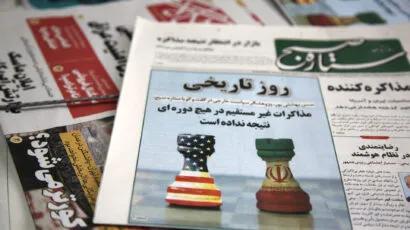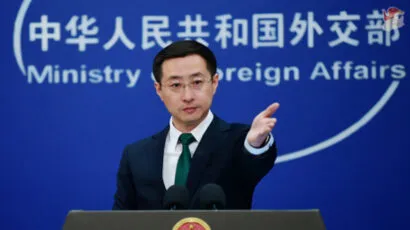Trump could win back the nuclear codes. Biden should put guardrails on the nuclear arsenal—now.
By Tom Z. Collina | July 30, 2024
 It's time to reduce the likelihood of the day after.
It's time to reduce the likelihood of the day after.
On January 6, 2021, then-President Donald Trump inspired a mob attack on the US Capitol to try to prevent the peaceful transfer of power to the Biden administration. Not only was this an unprecedented attack on American democracy, but it represented a serious national security threat. Many saw and see this as one of many examples of an unstable President Trump acting in dangerous, irrational ways. And throughout his time in office, Trump—like all presidents in the nuclear age—had the unilateral authority to launch the US nuclear arsenal.
At any moment, Trump could literally have ended the world with a phone call. Congressional approval is not needed, and the secretary of defense cannot stop a presidential order to unleash the US nuclear arsenal. The system is built for speed, not deliberation. The whole process, from presidential order to the launch of one or hundreds of nuclear warheads, would take just minutes.
The danger that Trump would do something catastrophic was so acute that then-House Speaker Nancy Pelosi desperately looked for ways to prevent the “unstable president from … accessing the launch codes and ordering a nuclear strike,” according to a letter Pelosi wrote in January 2021 to House Democrats in the wake of the January 6 attack on the Capitol. Chairman of the Joint Chiefs of Staff Mark Milley was convinced that Trump had suffered “serious mental decline in the aftermath of the election” and took the extraordinary step of ordering his staff to come to him if they received a nuclear strike order from the president. “No matter what you are told, you do the procedure. You do the process. And I’m part of that procedure,” Milley reportedly told the officers. “You never know what a president’s trigger point is.”
Pelosi and Milley had plenty of reasons to worry that Trump could start a nuclear war. In August 2017, in a thinly veiled nuclear threat, Trump warned North Korea that it would be “met with fire and fury and frankly power, the likes of which this world has never seen before.” Trump mocked Kim Jong Un, the North’s leader, writing “I too have a Nuclear Button, but it is a much bigger & more powerful one than his, and my Button works!” According to then-White House Chief of Staff John Kelly, Trump privately discussed the idea of using a nuclear weapon against North Korea and suggested he could blame a US strike on another country.
Actually, however, Milley was not correct when he told his staff that he was part of the formal procedure to launch nuclear weapons. As former Defense Secretary William J. Perry and I wrote in our 2020 book, The Button, policy established during the Cold War puts decisions about the use of nuclear weapons solely in the hands of the civilian president, not Congress and above all not the military. All the president need do is call the Pentagon’s War Room—using the nuclear “football” or some other means—and identify himself and give the order to launch. The president may choose to consult with senior advisors such as Milley but is not required to.
Milley broke these rules, as others broke them before him. During the Watergate crisis, then-Defense Secretary James Schlesinger was so concerned about President Richard Nixon’s mental state and alcohol consumption that he told military commanders that if Nixon ordered a nuclear strike, they should check with him or Secretary of State Henry Kissinger first. Sen. Alan Cranston phoned Schlesinger, warning him about “the need for keeping a berserk president from plunging us into a holocaust.”
Should Milley, Schlesinger, or any military leader, let a clearly unstable president start a nuclear war just to follow protocol? Of course not. But officials should not have to break the rules to do the right thing. The United States needs to change the policy that put Milley and Schlesinger in an impossible spot.
With just six months left in office, President Biden can fix the system for himself and all future presidents. To do so, Biden should announce the White House will share authority to use nuclear weapons in any first strike with a select group in Congress. The Constitution gives Congress the authority to declare war, not the president. The first use of nuclear weapons is clearly an act of war. In a situation where the United States has already been attacked with nuclear weapons, the president would retain the option to act unilaterally.
President Biden would have to make such a policy change by executive order. Passing congressional legislation would be more durable but is unlikely in the current political environment. If Trump wins the election, he would likely reverse Biden’s order. But if Vice President Kamala Harris wins, the new policy could be strengthened over time with legislation.
Such a policy would provide clear directives for the military to follow: A launch could be ordered only if the United States had already been attacked with nuclear weapons or if Congress had approved the decision, providing a constitutional check to executive power. This would be infinitely safer than our current doctrine.
As an important part of his legacy, President Biden must put guardrails on presidential authority to start nuclear war now before the next dangerous leader gets elected—whomever and whenever that may be. We must never again entrust the fate of the world to just one fallible human. This is not about whose finger should be on the button. This is about making good policy that can keep Americans—and people around the world—alive, regardless of whom US voters happen to put in the White House.
Together, we make the world safer.
The Bulletin elevates expert voices above the noise. But as an independent nonprofit organization, our operations depend on the support of readers like you. Help us continue to deliver quality journalism that holds leaders accountable. Your support of our work at any level is important. In return, we promise our coverage will be understandable, influential, vigilant, solution-oriented, and fair-minded. Together we can make a difference.
Keywords: 2024 election, Donald Trump, Joe Biden, Mark Milley, Nancy Pelosi, US nuclear authority, US nuclear doctrine, nuclear football, sole authority
Topics: Nuclear Weapons, Opinion















The difference between then and now is trump has learned to ONLY have YES men on his staff, those he knows will be totally loyal to him and will do his bidding without question, even launch a nuclear attack, especially against Iran. This policy does indeed to be changed or at very least modified so a POTUS can’t, on a whim or fit of rage, call for a nuclear attack.
You can never trust a complete madman whose willing to invoke the Insurrection Act to mass slaughter his own citizens when they dare to protest against his regime to have access to Nuclear Weapons as well.
I cannot agree more. The question is how to get this appeal on Biden’s agenda and priority list – there are too many elements competing for his attention.
Absolutely correct. As a Canadian, I don’t mind saying it’s mystifying and worrying that this awesome power rests in a single person’s control and there is no built-in mitigation or guardrails for an unstable POTUS.
I think you oversimplify the ability of any POTUS to react in response to a nuclear attack. It’s not a big red button in the top drawer of the Resolute Desk. There are several books and first person commentary that illustrate while the AUTHORITY rests with POTUS, it’s not a “one man show” to make that decision or employ nuclear forces. The Military Aides that carry the football are not going to act like Pavlov’s dog if a decision of this magnitude was made in a vacuum. Other key people, such as SECDEF, will participate. Why do you think SECDEF… Read more »
the reasoning behind having POTUS full authority to call for a nuclear launch is time for a retaliatory strike, there is/would be little time to wait for several members to approve it a launch. now would those members like SECDEF or those others who should be in that loop cancel a call for unilateral launch from POTUS for no reason? one would hope so but trump, “IF” he wins will fill critical positions with people loyal to him and will be “YES MEN” and might void this